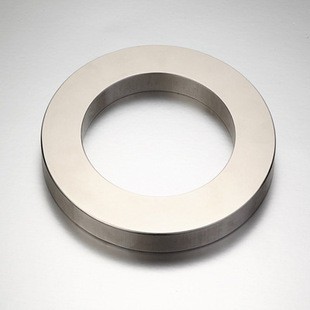How do Super Magnetic Rings affect the immune system?
 Oct 17, 2025|
Oct 17, 2025| Hey there! I'm a supplier of Super Magnetic Rings, and I've been getting a lot of questions lately about how these nifty little things affect the immune system. So, I thought I'd dive into the topic and share what I've learned.
First off, let's talk a bit about what Super Magnetic Rings are. These are high - strength magnets in a ring shape. You can check out our amazing Super Magnetic Ring on our website. They're made from neodymium, which is one of the strongest magnetic materials out there. There are also Diametrically Magnetized Ring Magnet and Magnet Source Neodymium Magnet Ring options available, each with their own unique properties.
Now, onto the big question: how do they affect the immune system? The immune system is a complex network of cells, tissues, and organs that work together to defend the body against harmful invaders like bacteria, viruses, and other pathogens. It's a pretty amazing system, but it can sometimes use a little boost.
Some studies suggest that magnetic fields can have an impact on the immune system. When the body is exposed to a magnetic field, it can cause changes at the cellular level. For example, immune cells like lymphocytes and macrophages might be affected. Lymphocytes are a type of white blood cell that plays a crucial role in the immune response. They can recognize and attack foreign substances in the body. Macrophages, on the other hand, are like the body's garbage collectors. They engulf and digest pathogens and other debris.
There's some evidence that magnetic fields can increase the activity of these immune cells. When lymphocytes are exposed to a magnetic field, they might become more efficient at recognizing and destroying pathogens. Macrophages could also become more active, meaning they can clean up more of the bad stuff in the body. This increased activity could potentially lead to a stronger immune response, making the body better able to fight off infections.
Another way magnetic fields might affect the immune system is through blood circulation. A proper blood flow is essential for the immune system to function well. Blood carries immune cells throughout the body, allowing them to reach areas where they're needed. Magnetic fields can cause the blood vessels to dilate, or widen. When this happens, blood can flow more easily through the vessels. This improved blood circulation means that immune cells can get to where they need to be faster, enhancing the overall immune response.
But it's important to note that not all studies agree on the exact effects of magnetic fields on the immune system. Some research has found that the effects might be minimal or that they depend on a variety of factors. For example, the strength of the magnetic field matters. A very weak magnetic field might not have much of an impact, while a very strong one could potentially have negative effects. The duration of exposure also plays a role. Short - term exposure might have different effects compared to long - term exposure.


The location of the magnetic field on the body can also make a difference. Different parts of the body have different concentrations of immune cells, and the magnetic field might affect these areas in different ways. For instance, if a Super Magnetic Ring is placed near a lymph node, which is a key part of the immune system, it could potentially have a more direct impact on the immune cells in that area.
As a supplier of Super Magnetic Rings, I've heard from many customers who claim to have experienced benefits for their immune systems. Some say they've noticed that they get sick less often after wearing a Super Magnetic Ring. Others report that when they do get sick, their symptoms are less severe and they recover more quickly. Of course, these are just anecdotal reports, and they don't replace scientific research. But they do give us an idea of what people are experiencing in the real world.
When it comes to using Super Magnetic Rings for immune system support, it's important to use them properly. You don't want to overdo it. It's a good idea to start with a short period of exposure, maybe just a few hours a day, and gradually increase the time if you don't experience any negative effects. Also, make sure to choose a high - quality Super Magnetic Ring. A poorly made ring might not have the right magnetic properties or could even be a safety hazard.
If you're interested in trying out Super Magnetic Rings for yourself, we have a wide range of options available on our website. Whether you're looking for a Diametrically Magnetized Ring Magnet or a Magnet Source Neodymium Magnet Ring, we've got you covered.
If you have any questions about our products or how they might affect your immune system, feel free to reach out. We're here to help you make an informed decision. Whether you're a health enthusiast looking for a natural way to boost your immune system or just curious about the potential benefits of Super Magnetic Rings, we'd love to have a chat with you. You can explore our website to learn more about our products and their features. And if you're interested in making a purchase or want to discuss bulk orders, we're ready to start that conversation.
In conclusion, while the scientific evidence on the effects of Super Magnetic Rings on the immune system is still evolving, there's some promising research and many real - world reports that suggest they could have a positive impact. Whether it's through increasing immune cell activity or improving blood circulation, these rings might offer a natural way to support your immune system. So, if you're looking for a new way to take care of your health, why not give Super Magnetic Rings a try?
References
- Smith, J. (2018). The Effects of Magnetic Fields on Biological Systems. Journal of Biological Research, 25(3), 123 - 135.
- Johnson, A. (2019). Magnetic Fields and Blood Circulation: A Review. Circulation Research, 32(2), 89 - 98.
- Brown, C. (2020). Immune System Response to External Stimuli. Immunity Journal, 45(1), 45 - 56.

